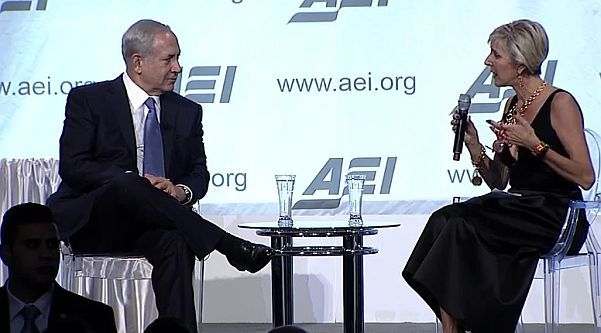
The Prime Minister of Israel Benjamin Netanyahu gave a frank interview at a gala award ceremony hosted by the American Enterprise Institute in Washington, D.C.
Sitting among friends and admirers, Prime Minister Netanyahu received the Irving Kristol award and went on to give an interesting response to a question by AEI’s Danielle Pletka on the merits of whether to spread dictatorship in the Middle East to oppose terrorist groups like ISIS, or to promote democracy, which could allow Islamists to gain power via the ballot box. What to do, what to do? Natanyahu went on to give a clear view of his understanding of the crisis in the Middle East and how it always comes back to what is really important to him and is his main preoccupation, the security of Israel at any cost, to all people.
The Federalist reports:

BYPASS THE CENSORS
Sign up to get unfiltered news delivered straight to your inbox.
You can unsubscribe any time. By subscribing you agree to our Terms of Use
Pletka asked: “There are plenty of voices, I would say growing in volume both in the U.S. and I think even in Israel, who would suggest that we are better off with the Gaddafis and the Saddams and the Assads in place to tamp down on the Islamists who rise up, and that secular dictatorship is really the solution we should look for the in the rest of the Middle East. Others say that democracy is only fertile ground for Islamists, who will rise up. Where do you come down on that?”
Netanyahu responded: “Well, when I went to serve in the United Nations 100 years ago, as Israel’s ambassador, there was a woman there, her name was Jeane Kirkpatrick [applause] and I had read an article that she had written called “Dictatorships and Double Standards.” And she said, basically, in this article, she said: “We are committed to the larger battle against Soviet totalitarianism and on occasion we decide, for the larger goal, to make arrangements with secular dictatorships.” That’s basically what she said.
“Now mind you, Saddam was a horrible, horrible, brutal killer, so was Gaddafi, there’s no question about that. I had my own dealings with each of them. But I do want to say that they were, in many ways, neighborhood bullies. That is, they tormented their immediate environment but they were not wedded to a larger goal.
American Enterprise Institute YouTube video:
“The militant Islamists, either Iran leading the militant Shiites with their proxies, Hezbollah and Islamic jihad and Hamas, even though Hamas is a Sunni… Or the militant Sunnis led by Daesh—by ISIS—they have a larger goal in mind. Their goal is not merely the conquest of the Middle East, it’s the conquest of the world.
“It’s unbelievable, people don’t believe that. They don’t believe that it’s possible to have this quest for an imamate or a caliphate in the 21st century, but that is exactly what is guiding them. And against this larger threat that would present two Islamic states. One, the Islamic state of Daesh, and the other the Islamic Republic of Iran, each one of them is seeking to arm themselves with weapons of mass death. Chemical weapons in the case of ISIS, nuclear weapons in the case of Iran. That poses a formidable threat to our world.
“Therefore, if I have to categorize the threats, I would say that these are the larger threats. Doesn’t mean you have to form alliances with secular dictatorships, it means you have to categorize ‘what is the larger threat?’ And that is something that I think is required from all of us. Political leadership involves always choosing between bad and worse. I seldom have had a choice between bad and good. I welcome it when it happens, but these are by far the easiest choices. It’s choosing between bad and worse that defines a good part of leadership, and I think I know how to choose that.”
On Syria, Netanyahu Says “Don’t Intervene” When Enemies Fighting
Pletka then shifted to Syria, to which Netanyahu offered this response: “If I see a problem, a situation where I don’t have a clear concept, I don’t charge in. In Syria, I do not see a simple concept.


